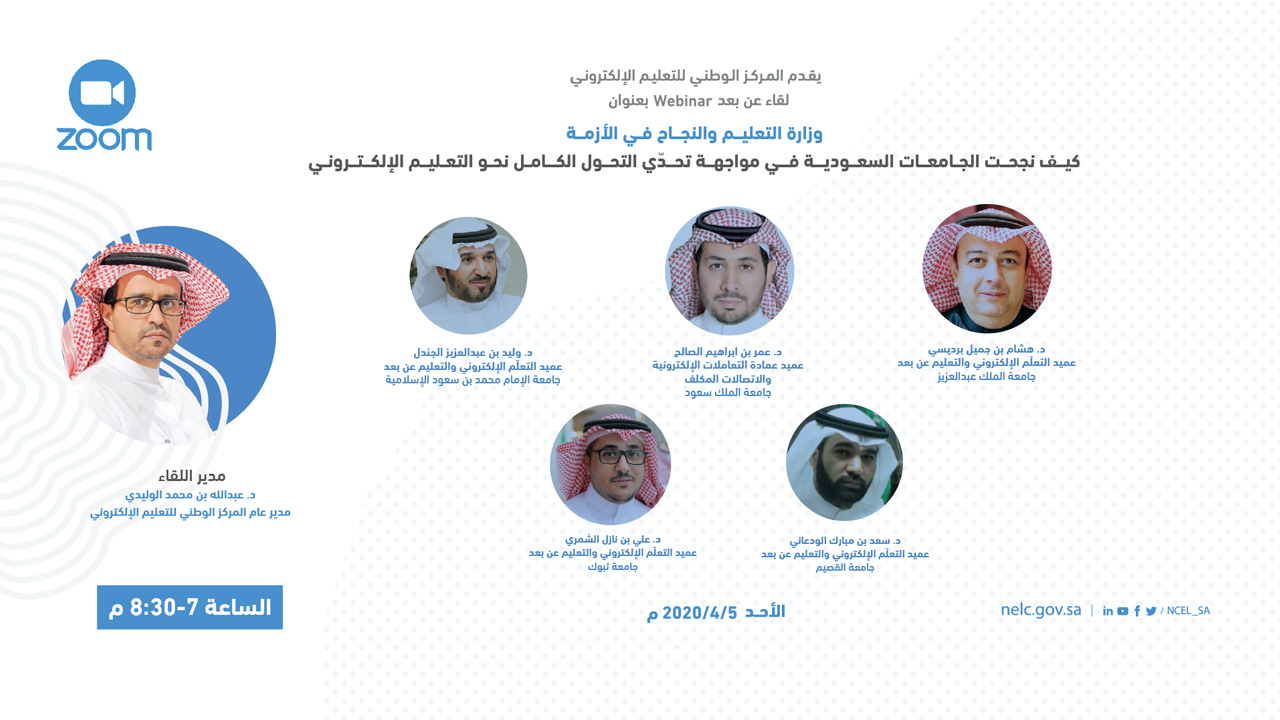
Dr. Abdullah Alwalidi, the Director General of the National eLearning Center expressed his sincere appreciation to the Custodian of the Two Holy Mosques and His Highness the Crown Prince for supporting education. He also acknowledged the distinguished efforts of the Ministry of Education represented by His Excellency the Minister and his Deputy, the Universities leaders: Rectors, Vice-Rectors and Deans of eLearning highlighting how these efforts contributed to the successful implementation of eLearning during the pandemic.
During a virtual meeting organized by the Center today, Sunday, entitled “The Ministry of Education’s Success in the Crisis." Several eLearning deans in Saudi universities participated in the meeting including Dr. Hisham Jameel Bardesi, Dean of eLearning and Distance Education at King Abdulaziz University, Dr. Omar Alsaleh, Acting Dean of eTransactions and Communications at King Saud University, Dr. Waleed Aljandal, Dean of eLearning and Distance Learning at Imam Muhammad bin Saud Islamic University, Dr. Saad Alwadaani, Dean of eLearning and Distance Learning at Qassim University and Dr. Ali Alshammari, Dean of eLearning and Distance Learning at University of Tabuk. The meeting was chaired by Dr. Abdullah Alwalidi, the Director General of the National eLearning Center.
The meeting addressed the universities’ experiences in transforming to eLearning during the pandemic, the most prominent challenges faced in higher education, and how these challenges were addressed and resolved. In addition, the meeting discussed the future of eLearning and potential directions, especially in the post-pandemic era, which has dramatically reshaped the way global education is delivered.
Dr. Alwalidi emphasized the importance of investing this experience in implementing effective practices to advance the development of education, given that eLearning has become an essential component of the future of education.
Dr. Hisham Bardesi indicated that one of the challenges in moving to eLearning is changing the culture of both students and faculty members and how to ensure that education address learners’ needs and abilities especially with special needs’ students whether now or after the pandemic.
Dr. Ali Alshammari stressed that the current experience has reshaped our understanding of pedagogy and instructional design theories, and the time has come to create opportunities for faculty members to practice and apply these fundamentals, and to integrate them in the eLearning environments to enhance the teaching and learning process.
Dr. Waleed Aljandal explained that the experience of eLearning during the crisis broke the psychological barrier among faculty members and students and that what is required now is to give them a greater motive, and direct them towards developing self-learning tools, in addition to the importance of developing content that can address students’ needs.
Dr. Omar Alsaleh stated that it has become imperative for universities to adjust their educational strategies and approaches to integrate eLearning as an essential element in the instructional environment and this entails developing and enriching question banks and digital content and resources highlighting the importance of engaging all faculty members in this process as one of the most important success factors.
Dr. Saad Alwadaani affirmed that the current experience of remote teaching will redefine the norms in many practices not only within the instructional environment but other organizational and administrative activities which can be performed effectively remotely. He stated that what we are witnessing now due to the pandemic will certainly be the new norm.
The participants further discussed the future of eLearning and its economic impact on reducing costs and improving outcomes.
This meeting was a part of virtual meetings, organized by the National eLearning Center, with the participation of national and international experts in the field of eLearning, aiming at promoting the successful transition towards digital learning during the current crisis.

